Latest posts by Michael Gerber (see all)
- From Faith Current: “The Sacred Ordinary: St. Peter’s Church Hall” - May 1, 2023
- A brief (?) hiatus - April 22, 2023
- Something Happened - March 6, 2023
“Lennon and McCartney: Together Alone” (2007) is an in-depth look at the solo careers of both men that is comprehensive, well-written and illustrated, and refreshingly free of bias. It’s changed the way I think about some of Lennon’s and McCartney’s solo music. For example, I’ll never hear “Watching the Wheels” the same way again.
I can hardly stand to read anything biographical about either Lennon or McCartney anymore, since so many writers moved to compose book-length works on them are grinding an ax of some variety. Reading John Blaney’s book was, for me, like opening a window and letting welcome fresh air into an overheated room…
Blaney writes with interest about both Lennon and McCartney and spends more time on facts than speculation. The discussion of every album includes extensive notes on its recording, including personnel on each track and comments from many people involved in the work. Rather than emphasizing his own interpretations, Blaney mostly allows people directly involved with the music—especially Lennon and McCartney themselves—to speak about it.
When Blaney does speculate, he makes it clear he’s doing so and grounds the speculation in something tangible. Here, for example, is the part of his commentary that’s changed the way I hear “Watching the Wheels”:
“But Lennon had been contemplating more than the fast-turning wheels of showbiz. Religion and spirituality had influenced him. Where previously he’d tried to imagine a world without religion, he now found himself drawn to it. The Ba’hai Faith may have affected Lennon: its central belief, that humanity is one single race and that the day has come for its unification into one global society, was condensed into a pithy aphorism, “One World, One People,” and inscribed into the dead wax of the “(Just Like) Starting Over” single. The wheels Lennon found himself contemplating were, more often than not, those governing destiny: the karmic wheels that influence the spiritual evolution of humanity as a whole.” (p. 146)
Now, I don’t know whether Blaney is right about Lennon’s possibly being influenced by the Ba’hai faith, but there’s certainly a chime between that faith’s key beliefs and Lennon’s hope for a world not riven by religious or national differences. Thinking about that makes it a bit easier for me to understand how the author of the anti-religious “Imagine” was also fascinated by numerology, horoscopes, and other forms of mysticism.
And I’d never have known about the writing in the deadwax, since I don’t have that 45.
So thanks, John Blaney, for producing a Lennon/McCartney book that manages to be both even-handed and illuminating.

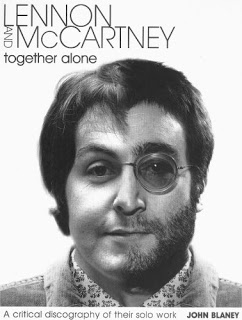
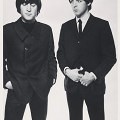
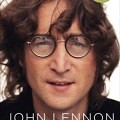
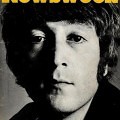
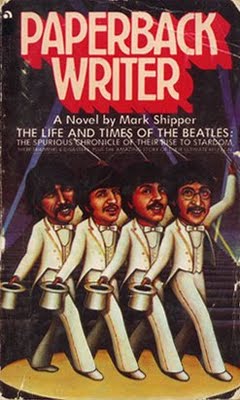


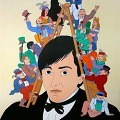
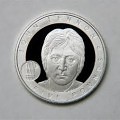
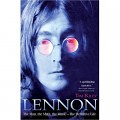
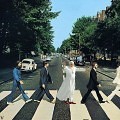
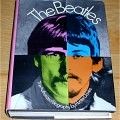
I don’t know. I always interpreted the wheels as being the wheels of industry, the wheels of commerce, that John had removed himself from, leaving the business meetings to Yoko. He’s watching the wheels go round and round, but he just had to let it go.
I think those two interpretations may be compatible, Anon. I’d always thought of the lines as only being about the wheels of commerce, but thinking about them as karmic wheels adds a dimension to the song for me. Why would he “love to watch them roll” if they’re just commercial wheels?
With all due apologies to men, I think that since most (if not all) prominent books about the Beatles are written by men, with a man’s sensibility, they miss the homoerotic point of the Lennon/McCartney connection (present blog authorship excepted.)
Karen, I for one have always been really puzzled with the “heat” that lots of Beatle fans have regarding the homoerotic aspects of Lennon and McCartney’s friendship. Setting aside whether anything sexual happened between the two of them–none of our beeswax anyway–any suggestion that there might be an amorous-level of intensity in their relationship makes some people go bonkers.
Yoko stokes this fire for reasons only she knows, periodically alluding to some sort of crypto gayness on Lennon’s part. So not the point. McCartney denies they were ever physical, and I believe him FWIW, but all this is much too literal-minded. Two artists locked together as they were, especially from a young age, living out of each other’s pockets, going through the strangest experience you can imagine–whatever else it was, it was surely some kind of love affair. Not for nothing did Lennon/McCartney blossom after Stu died.
Collaboration is a very intense psychological process; the partner sees all your shit, and you see theirs. You “save” each other in public and private, time after time after time. The equation gets complicated, and the only other types of adult relationships with such extensive algebra are sexual partners. So the comparison is illuminating. A friendship with the intensity of a love affair, a business partnership with the dynamics of a marriage–call it what you will, but one can’t deny the erotic charge without undervaluing the deep emotional connection these two guys had. IMHO, it’s the emotional connection that matters, not where one’s wee-wee goes, especially when you’re talking about these two people.
Karen, very interesting comment!
I am female too.
I believe that John wanted to share everything with Paul right up to drugs and sex, but Paul refused. This happened in India. This is why Paul wrote “Why don’t We do it in the Road”.
Remember, Paul went home early from India and the atmosphere in the studio was poisoned after the stay. John felt offended.
You cannot overestimate die importance of their relationship to the existence of the group, the Beatles.
A good point, Karen — I wonder if one of the reasons for the side-choosing I mentioned in some books about Lennon, McCartney, or the both of them stems from the author’s discomfort with the intensity of that relationship.
If you look at the language Lennon and McCartney used about each other, it’s clear how deep their relationship ran (I don’t think it was sexual, but it sure was emotional). John calling Paul an estranged “fiance” when he was playing “Whatever Gets You Through the Night” with Elton John, Paul singing “I love you” on “Here Today” . . . . Even the savageness of their animosity points to the underlying depths. You can’t get that mad at someone you don’t care about.
As much as the cover of Blaney’s book creeps me out, it — and the title — are getting at something true. However much they fought, I don’t think Lennon and McCartney never really separated emotionally.
I read an interesting column not long ago, written by two sets of academics who collaborated together on their research. One was a gay man and a lesbian woman who collaborated. The other were to straight men (both married to women). And both pairs of partners talked about how their collaboration meant that they often had characteristics of a romantic couple (finishing each other’s sentences, speaking on behalf of the other, complimenting the other) — so much so that people often assumed both pairs were romantic, even though neither was.
We may never know if John and Paul had a sexual relationship, and it may never have reached that point. But the nature of John and Paul’s deep, years-long collaboration would easily have meant that they had a deep emotional attachment and that their relationshp took on aspects of a romantic couple, whether it ever reached that point or not.
— Drew
Paul wouldn’t lie to “protect” himself, he would lie to protect others.
By “heat” Michael, do you mean opposition, or passionate interest? I think there could be two schools.
And I agree–none of our beeswax, however much we are nosy about it. 🙂
“One can’t deny the erotic charge without denying the emotional connection.”. Exactly. Since many male authors do the former, they unavoidably do the latter.
Their books become a weird pissing contest between John and Paul (or between them, John, and Paul).
As Nancy said, the bias is obvious.
Karen, I meant “opposition,” though for me it’s one of the things that really holds my interest in The Beatles over the years. I worked with a writing partner for about ten years, and scaled some heights with him (though hardly Beatle-like heights) and so the delicate dance John and Paul did with each other is fascinating to me.
Coming from the same time and place, and so desperately determined to be seen as distinct from the other; competing to the death, but supporting to the hilt; egotistically divvying everything up into “I did that and he did this”–while at the same time knowing in your bones that none of it would’ve been nearly as good without the magical multiplicative power; fighting, but then lighting into any outsider that would dare criticize the partner; managing all the emotions around success and failure; and the simple, incredibly complex act of creating things that, if they are to be good, must reflect YOU, and if they are to be great, must have room for HIM TOO…
Anyhow, not to hijack the thread. J&P are endlessly fascinating to me, as a team and as individuals–save for when they’re tallying up the scores in public. That I could care less about, which is interesting because it’s exactly the opposite of what the ego tells us. “The world must know that I, John Lennon, helped write the lyrics to Eleanor Rigby, because then the world will love me more!”
Karen and Michael, I’m enjoying hearing your thoughts on the Lennon/McCartney partnership. Michael, it’s especially interesting to hear from someone who’s actually had that kind of collaboration with someone.
I agree that the public scorekeeping (I wrote this, he wrote that) is tiresome, and a good example of how Lennon and McCartney painted themselves into their respective corners after the breakup. Once they started airing their animosity in the press and making statements about who contributed what, there was no way to get out of that game entirely, and I think it hurt them both badly.
Watching something about WWI, I learned that “trench knives” with triangular blades were used in hand-to-hand combat during that war because the jagged wounds they made were so difficult to heal. Lennon and McCartney used words on each other rather than blades, but I think they inflicted that kind of damage on each other.
Nancy, what were you watching about WWI? It’s a huge interest of mine, and part of a new book I’m writing. So, spill.
Michael, sorry to say I don’t remember exactly what I saw — pretty sure it was a documentary on PBS. It may have been this one: http://www.pbs.org/greatwar/
BTW, this thread is now proof that the Beatles are, in fact, connected to everything.
Thanks, Nancy–that’s a good one. Although for pure bulk, there’s no beating the BBC’s 26-part “The Great War” from 1964 (it’s like “The World at War,” but for WWI).
I’ve always felt that The Beatles phenomenon was the other side of the coin to the great mass movements based on nationalism and savagery. Not for nothing did Lennon give the Nazi salute in front of those undulating crowds; Beatlemania was an exercise in mass release, but for positive ends for once, not negative ones.
Yes, and it made sense that Lennon was in “How I Won the War” — “connection” in the sense of “opposition.”
Anon: “I believe that John wanted to share everything with Paul right up to drugs and sex, but Paul refused. This happened in India. This is why Paul wrote ‘Why don’t We do it in the Road’.
Sounds like a song one would write if that were the case – if John were the composer.
Did their trip to India, where this supposed turning point in their relationship occurred, happen before or after they looked as close as ever in the Hey Bulldog video? Their relationship started going bad in 1968, that can’t be disputed. Why people assume something happened in India to cause this, I have no idea. TM isn’t Paul’s bag and Ringo, for his part, hated the food.
@Michelle, let me see if I can dredge all this up from the earlier conversations:
It seems clear that the group was functioning well, as they had through 1967, as of February 1968 (Hey Bulldog/Lady Madonna sessions). Lennon shows the first evidence of something seriously wrong with his abrupt and furious departure from India (April), including his denunciation of Cyn during the flight back to London. Then, there’s some moments of functioning (Esher demos in May; NY Apple trip), but also John’s bad trip with Derek Taylor, his sleepover with Yoko (May 19) and his convening a meeting at Apple to announce that he’s Christ (sometime in May). By May 30/31, Yoko’s joined them in the studio, and Lennon is abusing Geoff Emerick, and the bad vibes are in full effect.
.
I personally think that Lennon was suffering from a kundalini emergency, brought on by too much meditation without any guidance. Meditation, especially a LOT of meditation with no preparation, is no joke; and if you add drugs into the mix, the energies released can be uncomfortable for the person to process.
.
This type of thing would cause the type of emotional (and physical) discomfort that he seems to show after April 1, and his behavior — lashing out, using drugs to alter his uncomfortable nervous system, and eventually blowing up his marriage and his central work relationships — is also typical of this condition. If a person goes through one of these awakenings — which are actually a positive sign of growth — it’s really important that they have trusted people in their lives that can guide them and help reassure them; this allows for the maximum benefit with the minimum dislocation.
Michael, thank you for the detailed explanation which sounds very plausible to me. The last link you provided is interesting. It never occurred to me that meditation can be dangerous. I always thought it was a form of hypnosis, so it really doesn’t surprise me. I didn’t realize he left India in a fury, although I did read about the incident with Cynthia (was this where he admitted his infidelity?). And we know about his disillusionment with the Maharishi. However, some folks have this theory that John propositioned Paul in India, he was rejected and that is why John’s behavior changed so abruptly. I think this was brought on by Philip Norman and his own theory that the bohemian John contemplated an affair with the immovable heterosexual Paul. Man, did these guys have issues. I think it was Ringo who said it must have been harder to be Elvis because he only had himself for support, whereas the Beatles were four brothers who would check in on each other if something wasn’t right. That didn’t last long as John seemed to struggle on his own.
@Michelle, I’ve had a lot of experience with meditation and some with hypnosis and I can tell you that while certain forms of meditation can induce a trance-like state (particularly the mantra-repetition types like TM) it’s quite distinct from hypnosis. In meditation, you’re always completely aware of your surroundings and able to move with volition; you actually feel sharper and more aware in, for example, vipassana (mindfulness) meditation. There’s a slight increase in suggestibility I suppose, but I think that would dissipate immediately if you were asked to do something complex. A teacher/leader might say, “Feel your stomach, and the process of digestion,” and you go to that part of your body and the attention allows you to feel those sensations more intensely. But if they said, “Get up and hop on one foot,” you probably wouldn’t feel much of a great urge to do that. If you did it, you’d be in complete control; you wouldn’t feel altered or sleepy or high. You’d be doing it because you wanted to do it, and people would likely be smiling or laughing. Meditation does not entail any of the “forgetting” that is commonly in hypnosis.
.
What meditation is, is a whole body experience that seems to be directly jacked into the body’s energetic system — something like yoga or qigong, or martial arts, or acupuncture. Changes in the equilibrium of one’s energy system can be very powerful, and can have definite physical/somatic effects, as well as mental ones. The kind of meditation, and more than that the length and intensity of the meditation that they were doing in Rishikesh was not to be trifled with. Especially when the practitioners were fundamentally unprepared; nowdays that situation would be restricted to experienced practitioners, with teachers, daily check-ins, and weeks if not months of prep. J/P/G/R were coming from a situation where they were eating a different diet (meat rather than vegetarian) and doing a lot of drugs; even cannabis has very definite effects on the energy system. The shift from London Beatlelife to the Rishikesh monastic-lite would be really wrenching, and while in general I’m positive about the Maharishi and his impact on the group (and his intent towards them), I think it was *incredibly irresponsible* for him to throw them into the deep end like that, especially Lennon. Harrison hadn’t really used drugs for a while before India, and had been eating vegetarian, and had begun to have a collection of gurus to turn to, as well as done some reading. So he was much more prepared than Lennon was for what was guaranteed to be a very intense experience, if you really threw yourself into it.
.
If you’re doing all this with a Western mindset, when you feel like utter shit, you’re not going to say, “Oh! This is a block in my energetic system which is making me depressed/angry/hopeless/etc. I need to ease off the meditation, and maybe eat something grounding like beef, and take a lot of hot baths”, you’re going to look over at your poor wife, or your poor bass player and go, “YOU! YOU are the reason I feel like dying!” And/or you’re going to add in a bunch of chemicals to attempt to cover over the feeling; but that doesn’t work; you end up high and miserable, then hungover and miserable.
.
This all sounds like hooey, but it’s an actual thing that happens. Which is why it occurred to me as a possiblity.
.
As to the theory that John propositioned Paul, Paul rejected him (or accepted him, then had second thoughts), I think that was my theory? It fits with what we know, chronologically, and sexual energies would like be stirred greatly by that amount of meditation (and/or you’d be craving distraction from bodily discomfort, and sex tends to “ground” your energy, so it can make you feel better). But it’s just a guess, and as I’ve said many times, doesn’t really change my opinion about anything in a major way. It’s just one possibility among many.